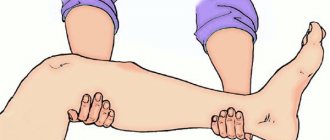IN THIS ARTICLE
- Delayed speech development in children
- Visual impairment in children
- Delayed motor development in children
- Social and emotional developmental delay
- Delayed cognitive development
Each child is unique and develops at their own pace. The boundaries of what is considered normal for a child’s age characteristics are quite arbitrary. A mother who closely watches the growth of her beloved baby needs to remember this. But it wouldn’t hurt to learn about possible signs of a child’s developmental delay (speech and mental), which should alert parents. Such symptoms may indicate problems in one or more areas of emotional, mental or physical development. If a child is diagnosed, this is not yet a reason to panic. The main thing is to take timely measures to help the child overcome difficulties in the future or even catch up.
Signs and symptoms of child development delay
There are many types of developmental disabilities in infants and young children. These include problems with:
- language and speech;
- vision;
- motor skills;
- social and emotional skills;
- cognitive abilities.
Violations can occur in certain areas or in all at once. Then we are talking about “general developmental delay of the child.” It occurs for one of the reasons:
- genetic disorders such as Down syndrome;
- fetal alcohol syndrome (fetal alcohol syndrome), caused by maternal alcohol consumption during pregnancy;
- Fragile X syndrome is a hereditary cause of cognitive impairment;
- serious health problems that are associated with prematurity and appear immediately after the birth of the child;
- other unknown reasons.
Let's take a closer look at the symptoms of various developmental disorders that can occur from the moment a baby is born until the age of 2. We will also talk about the factors that caused the pathology, and about possible treatment methods.
Causes
The etiology of mental retardation includes a number of reasons that can cause it:
- Genetic predisposition;
- Chronic stress;
- Pathology of pregnancy;
- Minimal brain dysfunction (transient dysfunction of the nervous system, which responds well to treatment, the prognosis is favorable);
- Exchange disorders;
- Abnormalities of blood vessels;
- Cerebral disorders;
- Intoxication;
- Past viral or bacterial diseases;
- Organic lesions.
The latter are much less common, but it is necessary to conduct a comprehensive examination to find the true cause of the disease.
ZPR is a borderline psychomotor disorder, that is, it is something between normal and pathological. With a favorable family environment, regular work with the child, reducing the child’s exposure to irritating factors and following all medical recommendations, mental retardation can disappear on its own without the use of medications.
It is worth noting the fact that disturbances in the psychomotor development of a child, as with minimal brain dysfunction, are transient. With timely and competent therapy, the clinical picture smoothes out and allows the baby to live a normal life, no different from his peers.
Delayed speech development in children
Speech problems in children are very common. Speech is the verbal expression of thoughts using words. Language is a broader concept that includes a system of symbols for transmitting and receiving information. This includes communication using sign language.
Possible causes of delayed speech development in a child
Speech disorders may occur in the following cases:
- when a baby is taught to speak several languages at once, this can negatively affect the speech development of young children, but this does not apply in any way to schoolchildren.
- the child's learning disability;
- child abuse, neglect;
- dysarthria - problems with the muscles of the speech apparatus, which are responsible for sound pronunciation;
- severe hearing problems, which may be caused by middle ear infections or certain medications, injuries, or genetic disorders.
- Autism spectrum disorders are a group of neurological disorders that affect a child’s communication, social interaction, and cognitive skills.
- other disorders not studied by science.
Methods for treating speech delay in a child
If you or your pediatrician suspect a delay in speech development in your baby, you should definitely examine the child. First you need to have your hearing tested, and then visit a speech therapist. He will examine the child’s tongue and evaluate the pronunciation of sounds. Perhaps he will recommend exercises for the child if speech development is delayed at home or a course of speech therapy classes. In case of minor violations, experts recommend:
- communicate more with your child - talk, sing together, let him repeat words and phrases after you;
- Read books to your child every day;
- practice your speech regularly;
- in case of infection in the middle ear, undergo treatment.
Signs of speech delay
Consult your doctor if you notice any of the following symptoms in your child. Also tell the doctor if your baby suddenly loses previously acquired abilities.
So, the help of a specialist is necessary if the child:
At 3-4 months:
- does not respond to loud sounds;
- does not babble;
- begins to babble, but does not try to imitate sounds (at 4 months).
At 7 months:
- does not respond to sounds;
At 1 year:
- does not speak a single word (for example, “mom”);
- does not understand the meaning of words such as “yet” or “no.”
At 2 years:
- does not have at least 15 words in his vocabulary;
- does not independently use a two-word phrase in speech; can only repeat words if asked;
- speaks only when necessary.
Visual impairment in children
Up to 6 months, a newborn sees objects in a blurry form. Six-month-old babies are already developing coordination of vision in both eyes. But sometimes this does not happen, or other problems with the eyes appear.
Possible causes of visual impairment in a child
Refractive vision disorders such as myopia and farsightedness are common in children. There are other types of problems:
- Amblyopia (lazy eye) - visual impairment in one eye;
- congenital cataract - clouding of the lens of the eye or another hereditary problem. Fortunately, this condition is rare;
- retinopathy of prematurity is an eye disease that sometimes affects babies born prematurely;
- strabismus is a violation of the position of the eyes.
Methods for treating visual impairment in a child
If you seek medical help in time, you can correct many vision problems. Depending on the type and cause of the disorder, the child may need:
- glasses or contact lenses;
- special glasses;
- surgery;
- eye patch.
Signs of visual impairment in babies
Visit your doctor if your child:
At 3 months:
- does not follow moving objects with its eyes;
- does not pay attention to his hands (from 2 months);
- has trouble moving one or both eyes in any direction;
- Most of the time he squints his eyes.
At 6 months:
- one or both eyes always look inward or outward;
- experiences persistent watery or dry eyes;
- Do not follow objects close to you (at a distance of 20-30 cm) or located at a distance of 2 meters.
If your child has lost any previously acquired visual skills, also tell the doctor. If the pediatrician suspects a problem with the baby’s eyes, he will most likely give a referral to an ophthalmologist to clarify the diagnosis.
Delayed motor development in children
Problems in motor skill development may manifest as difficulty with gross motor movements, such as crawling and walking, or fine motor movements, such as reaching the fingers when using a spoon.
Possible Causes of Problems with Gross and Fine Motor Skills
In children born prematurely, motor muscle development may occur at a slower pace.
Other possible causes of problems with gross and fine motor skills:
- ataxia is a disorder in which muscle coordination is impaired;
- cerebral palsy - a condition caused by damage to the fetal brain in the womb;
- cognitive impairment;
- myopathy - muscle disease;
- vision problems;
- back Bifida is a genetic pathology that causes partial or complete paralysis of the lower body
Ways to treat motor problems in children
Doctors usually recommend encouraging your child to be physically active in everyday life. If the case is complex, physical therapy sessions may be required. Certain types of physical or occupational therapy can help overcome difficulties with fine motor skills or sensory impairments.
Symptoms of delayed motor skills
To detect the disease early, be attentive to possible symptoms of movement disorders. In addition, observe whether the child at some point stopped performing actions that were already familiar to him.
A specialist examination is necessary if the baby:
At 3-4 months:
- does not try to reach and grab an object, cannot hold it;
- doesn't hold his head well;
- does not bring objects to mouth (at 4 months);
- does not push off with legs when they rest on a hard surface (at 4 months).
At 7 months:
- has very stiff or, conversely, too flexible muscles;
- throws his head back when sitting;
- reaches for objects with only one hand or does not reach at all;
- cannot bring an object to his mouth;
- does not roll over in any direction (from 5 months);
- cannot sit without assistance (from 6 months);
- Doesn't rest against your feet when you lift it upright.
At 1 year:
- cannot crawl;
- drags one arm or leg while crawling;
- cannot stand on support.
At 2 years:
- does not walk (up to 18 months);
- does not stand when walking from heel to toe, or walks only on tiptoes;
- cannot push a wheeled toy.
How to recognize mental retardation in children?
The child may experience problems interacting with adults or other children, which are called delays in social and/or emotional development (in other words, mental health delays). Usually such problems appear before the child goes to school.
Possible causes of social and emotional delays
Some abnormalities in social and emotional areas are caused by:
- pedagogical neglect;
- ineffective parenting or excessive attachment problems;
- cognitive impairment;
- other unknown reasons.
Another common cause of delayed social and emotional development is associated with a diagnosis of autism spectrum disorder (ASD). Previously, this disorder was called “pervasive developmental disorder” (PDD), autism, Asperger syndrome. ASD includes pathologies that cause a child to have difficulty communicating, repeating repetitive behavior and speech problems.
Methods for treating mental retardation in children
There are currently no medications that would treat autism. But corrective methods may include:
- special types of behavioral and educational therapy;
- medications to help with problem behavior.
Early diagnosis of pathology can significantly help the child. In some cases, play therapy or techniques are used that develop attachment between the baby and parents.
Signs of emotional or social developmental delay
When should you see a doctor? Pay attention to the symptoms listed below, and also observe whether the child’s behavior is losing the skills he has already acquired. You should be wary of the following in your baby’s actions:
At 3 months:
- does not smile at people;
- does not pay attention to new faces or is afraid of them;
At 7 months:
- refuses to hug;
- does not show affection to parents;
- does not like to be around people;
- behaves restlessly at night (from 5 months);
- smiles only when asked (from 5 months);
- does not laugh or squeal (at 6 months);
- shows no interest in playing hide and seek (at 8 months).
At 1 year:
- does not communicate through sounds, does not respond to smiles or facial expressions (at 9 months);
- does not make waving movements with his hands, does not try to reach an object or point at it.
Prevention
Delayed psychomotor development, the prognosis for treatment of which is favorable in most cases, requires a special approach, long-term complex influence, and dynamic observation of specialists. According to scientists, the number of children with mental retardation will continue to grow if preventive measures are ignored:
- plan pregnancy in order to exclude hereditary anomalies, disorders of the formation and maturation of the central nervous system;
- be regularly observed by a specialist during gestation, promptly identify systemic diseases;
- pay attention to the psycho-emotional state of children and engage in their development.
Parents should know the age characteristics of the child, norms, signs of anomalies in the formation of mental, emotional, speech skills and timely note them, seeking professional help.
Delayed cognitive development of a child
Cognitive disorders are related to thinking abilities. The child may have difficulty concentrating, memory, imagination, and making simple decisions.
Possible causes of thinking abilities in children
Deviations in the cognitive sphere lead to:
- various difficulties in the learning process;
- fetal exposure to alcohol or toxic substances such as lead during pregnancy and after birth;
- pedagogical neglect in infancy or early childhood;
- Down syndrome and other genetic disorders;
- autism spectrum disorders;
- serious health problems in the newborn;
- other unknown reasons.
Treatment options
As in the case of other problems in the development of a child, timely contact with specialists will help to successfully correct the violations. Regular exercise provides positive results in the development of certain cognitive skills. Teachers and therapists provide play or behavioral therapy, and also give recommendations to parents on how to work with their child at home.
Signs of cognitive delays
Take your child to a specialist if he:
At 1 year:
- does not look for objects that parents have hidden in the presence of the baby;
- does not use gestures at all, for example, does not wave his hand;
- does not point to objects or pictures;
At 2 years:
- does not understand the purpose of simple objects, such as a comb, telephone or spoon;
- does not follow simple instructions;
- does not repeat words and actions.
While observing the development of cognitive abilities, also monitor the child’s acquired skills. If at some point he suddenly stopped performing his usual actions, tell the doctor.
Conclusion
Remember, all children are different and may have individual characteristics in character and behavior. Only a specialist can determine the true pathologies of a child’s development. Most deviations in childhood are not complex and disappear with age. But even if a child has a serious diagnosis, you shouldn’t be too upset. The main thing is to find a good specialist in time and strictly follow his recommendations. Regularly undergo a medical examination with your child, during which the doctor will assess the child’s condition and progress from treatment. Fortunately, it is in early childhood that many developmental problems are successfully corrected.
Diagnostics
A neurologist collects a thorough medical history, learns about the mother’s bad habits, possible pregnancy pathologies and previous viral diseases. Then comes a neurological examination, which includes checking reflexes, excluding pathology of the musculoskeletal system and identifying psycho-emotional distress. To exclude organic defects and tumor lesions, MRI of the brain is prescribed. Pathological nerve impulses are excluded by conducting an EEG and neurosonogram. It is possible to conduct REG and x-ray of the skull. Having excluded gross concomitant pathology, the neurologist evaluates the psychomotor development of the child, comparing it with the clinical picture indicated in the article above.











